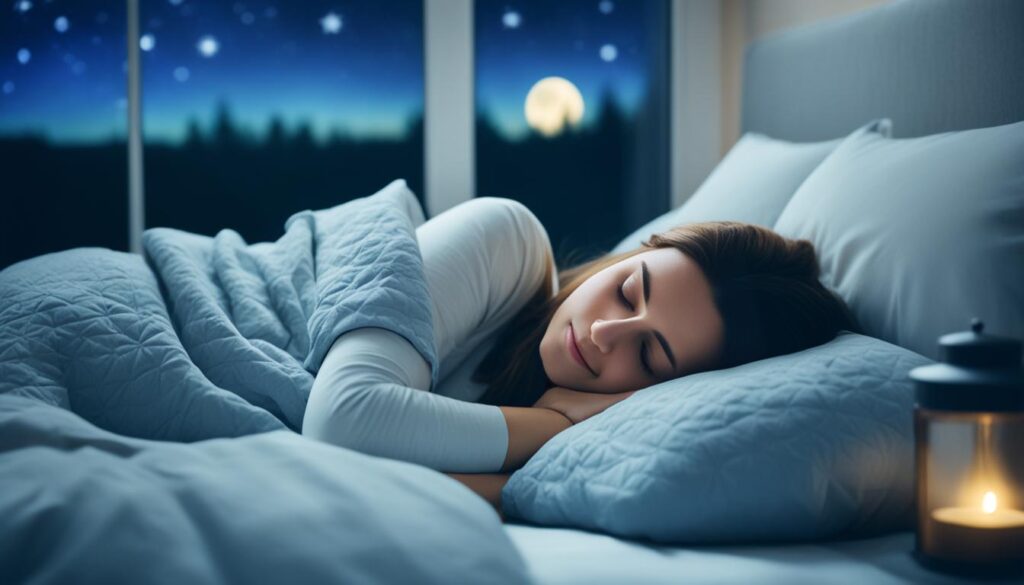Did you know that over 35% of American adults don’t get enough sleep? Not sleeping well can affect your energy, mood, and health. However, with the right advice for good sleep, you can improve your rest and overall well-being. Follow these tips to start getting better sleep tonight.
Key Takeaways
- Establishing a consistent sleep schedule and bedtime routine can promote better sleep quality.
- Creating a sleep-friendly environment, such as keeping your bedroom cool, dark, and quiet, can help you fall asleep more easily.
- Limiting screen time and avoiding caffeine and alcohol close to bedtime can improve your sleep.
- Regular exercise and relaxation techniques like meditation can enhance your overall sleep health.
- Addressing any underlying sleep issues or disorders can lead to a more restful and rejuvenating night’s sleep.
Table of Contents
Establish a Consistent Sleep Schedule
Keeping a regular sleep schedule is key for healthy sleep tips and tips for good sleep at night. Going to bed and waking up at the same time every day helps your body adjust. This leads to better sleep quality and overall health.
Benefits of a Regular Sleep Routine
Having a consistent sleep schedule has many benefits. It can improve sleep quality, increase daytime energy and alertness, and enhance cognitive function. Your body gets ready for sleep better when it knows when to rest. This makes falling asleep and staying asleep easier.
Tips for Sticking to Your Sleep Schedule
- Go to bed and wake up at the same time every day, even on weekends.
- Avoid taking naps during the day, as they can disrupt your nighttime sleep.
- Establish a relaxing bedtime routine, such as taking a warm bath or reading a book, to signal to your body that it’s time to wind down.
- Limit exposure to blue light from electronic devices in the hours leading up to bedtime, as it can suppress melatonin production and disrupt your sleep-wake cycle.
- Create a sleep-conducive environment by keeping your bedroom cool, dark, and quiet.
By following these healthy sleep tips and tips for good sleep at night, you can set a consistent sleep schedule. This promotes better sleep quality and overall well-being.
Create a Sleep-Friendly Environment
Creating a sleep-friendly environment is key for a good night’s sleep. The space where you rest greatly affects your sleep quality. By making simple changes to your bedroom, you can make it better for sleep.
Temperature and Lighting
Keep your bedroom cool, between 65°F and 70°F (18°C and 21°C). Bright light, especially from screens, can mess with your sleep cycle. Use dim, warm lighting in the evening to help your body wind down.
Noise Control
Try to keep outside noise down. Use a white noise machine or earplugs to block out sounds. If your area is loud, think about soundproofing your room or using a fan or air conditioner for a quiet sleep space.
Bedding and Furniture
Get a mattress and pillows that support your sleep needs. Clean bedding adds to a relaxing feel. Keep your bedroom tidy and free from devices to improve your sleep quality.
| Ideal Bedroom Environment | Factors to Consider |
|---|---|
| Temperature | 65°F – 70°F (18°C – 21°C) |
| Lighting | Dim, warm-toned lighting |
| Noise | Minimal external noise, use white noise or soundproofing |
| Bedding | Comfortable, supportive mattress and pillows |
Creating a sleep-friendly environment helps you sleep better. Focus on these areas to improve your sleep. This way, you’ll get the good sleep at night your body needs.
Develop a Relaxing Bedtime Routine
Creating a soothing bedtime routine can greatly improve your sleep quality. Adding calming activities before bed helps your body and mind relax for sleep. This makes it easier to get the rest you need.
Calming Activities to Try Before Bed
Try these relaxing practices before bed:
- Engage in gentle stretching or light yoga to release muscle tension and promote relaxation.
- Read a book or listen to soothing music to calm your mind and ease the transition to sleep.
- Practice deep breathing exercises or meditation to reduce stress and anxiety.
- Take a warm bath or use essential oils to create a calming atmosphere.
- Avoid screens and opt for a low-light, distraction-free environment in the hour before bedtime.
Find activities that work for you and make them part of your bedtime routine. Try different calming practices to see what helps you relax best.
“A good night’s sleep is essential for both physical and mental well-being. By taking the time to develop a relaxing bedtime routine, you can set yourself up for better quality sleep and improved overall health.”
Consistency is crucial for good sleep. Making your bedtime routine a habit leads to better sleep and health.
Limit Screen Time Before Bed
As the sun sets and bedtime comes near, pay attention to your screen time. Electronic devices like smartphones, tablets, and laptops emit blue light. This light can hurt your sleep quality.
This type of light messes with your body’s natural sleep cycle. It makes falling asleep harder and lowers sleep quality.
The Impact of Blue Light on Sleep Quality
Blue light from devices is bad for sleep. It stops the hormone that controls sleep from working right. This makes it tough to fall asleep and stay asleep.
Being on devices before bed can also make you tired during the day. You might have trouble focusing and face other health problems. It’s key to know how blue light affects your sleep and reduce its impact.
- Avoid using electronic devices for at least an hour before bedtime.
- If you must use a device, consider enabling the “night mode” or “blue light filter” feature to reduce the amount of blue light emitted.
- Invest in a pair of blue light-blocking glasses to wear in the evening hours.
- Create a relaxing and screen-free environment in your bedroom to promote better sleep.
Limiting screen time before bed helps you sleep better. It makes you feel refreshed and energized in the morning. Getting enough quality sleep is key for your health and well-being.
A good night’s sleep is crucial for your health. By following these tips and cutting down on blue light, you can sleep better at night. This leads to better physical and mental health.

Avoid Caffeine and Alcohol Close to Bedtime
Getting a good night’s sleep is key for your health and happiness. But, drinking caffeine and alcohol before bed can mess up your sleep. Knowing how these drinks affect your sleep is the first step to better sleep.
Caffeine keeps your brain awake and alert, making it tough to sleep. Experts say to skip caffeine at least 6 hours before bedtime. This lets your body process the caffeine and calm down.
Alcohol might make you sleepy at first, but it can make your sleep worse later. It messes with your body clock and causes poor sleep. Try to drink less alcohol 2-3 hours before bed.
| Substance | Impact on Sleep | Recommended Timing |
|---|---|---|
| Caffeine | Stimulates the brain, making it harder to fall asleep | Avoid at least 6 hours before bedtime |
| Alcohol | Initially may induce sleepiness, but disrupts sleep quality later in the night | Limit consumption at least 2-3 hours before bedtime |
Watch how much caffeine and alcohol you drink to help your sleep. These simple tips can make your sleep better and help you feel refreshed. Adding these tips to your routine is a big step towards better sleep.
Get Regular Exercise
Regular exercise can greatly improve your sleep at night. Studies show that it helps you fall asleep faster, sleep deeper, and wake up feeling refreshed. It’s a key factor in getting better sleep.
How Exercise Promotes Better Sleep
Exercise does more than keep your body healthy; it also supports your sleep. Here’s how it can help you sleep better:
- Reduces stress and anxiety: Physical activity releases endorphins, which can help alleviate stress and anxiety, two common culprits behind sleep disturbances.
- Improves sleep quality: Exercise can help you fall asleep faster and sleep more soundly throughout the night, leading to a more restful and rejuvenating slumber.
- Regulates body temperature: Exercise can help regulate your body’s internal temperature, which is crucial for the natural sleep-wake cycle.
- Enhances sleep-wake cycles: Regular physical activity can help synchronize your body’s circadian rhythms, ensuring a more consistent and predictable sleep-wake pattern.
It’s important to find an exercise routine that suits you and stick with it. Whether it’s a walk, yoga, or a workout, regular physical activity can greatly improve your tips for good sleep at night and overall health.
“Exercise is one of the most powerful and effective tools we have for improving the quality of our sleep.”

Adding exercise to your lifestyle can greatly improve your why a good night sleep is important. Your body and mind will thank you.
Practice Relaxation Techniques
Getting good sleep is more than just sticking to a schedule or making your bedroom sleep-friendly. Adding relaxation techniques to your daily life can greatly improve your sleep. Meditation and deep breathing are two great ways to relax and help you sleep better.
Meditation and Deep Breathing
Meditation helps calm your mind and body, making it easier to fall asleep. By focusing on your breath and letting go of worries, you prepare your body for sleep. Deep breathing does the same, soothing your body and mind with its rhythmic pattern.
Try these techniques by setting aside 10-15 minutes before bed. Find a quiet spot, sit or lie down, and close your eyes. Focus on your breath, slowly inhaling and exhaling. If your mind wanders, bring your focus back to your breathing. With regular practice, you’ll find it easier to relax and sleep.
It’s important to find relaxation techniques that suit you and add them to your bedtime routine. Taking time to unwind before sleep sets you up for better rest.
advice for good sleep
Getting enough sleep is key for your health and feeling good. There are expert tips to help you sleep better. By using these tips, you can wake up feeling refreshed and ready to go.
One top tip is to stick to a regular sleep schedule. Go to bed and wake up at the same time every day, even on weekends. This helps your body clock stay in sync. Also, doing something relaxing before bed, like taking a warm bath or stretching, tells your brain it’s time to sleep.
It’s also important to cut down on blue light from screens before bed. Blue light from devices can mess with your sleep cycle. Instead, read a book or do something calming to get your mind ready for sleep.
- Establish a consistent sleep schedule
- Create a relaxing bedtime routine
- Limit screen time before bed
- Avoid caffeine and alcohol close to bedtime
- Practice relaxation techniques like meditation or deep breathing
By following these expert tips, you can get better sleep at night. This means you’ll wake up feeling refreshed and ready for the day.

“Getting enough quality sleep is one of the most important things you can do for your health and well-being.”
| Tip | Benefits |
|---|---|
| Consistent Sleep Schedule | Regulates circadian rhythm, improves sleep quality |
| Limit Screen Time | Reduces exposure to blue light, promotes better sleep |
| Relaxation Techniques | Lowers stress and anxiety, facilitates faster sleep |
Address Underlying Sleep Issues
If you’re having trouble sleeping, you might have an underlying sleep disorder. Finding and fixing these problems is key to better sleep and health.
Common Sleep Disorders and Solutions
Common sleep disorders include insomnia, sleep apnea, and restless leg syndrome. Let’s look at these and how to handle them:
- Insomnia – This is when you can’t sleep or stay asleep. To fight insomnia, try relaxing, avoid screens before bed, and stick to a sleep schedule.
- Sleep Apnea – This is when you stop breathing while asleep. To treat it, you might use a CPAP machine or keep a healthy weight.
- Restless Leg Syndrome (RLS) – This is a condition that makes you want to move your legs, which can disrupt sleep. For RLS, you might take medicine, stretch, or change your sleep habits.
If you think you have a sleep disorder, see a doctor. They can figure out what’s wrong and create a plan to help you sleep better.
Fixing sleep problems can greatly improve your health and well-being. It’s an important step towards better sleep and overall health.
| Sleep Disorder | Symptoms | Possible Solutions |
|---|---|---|
| Insomnia | Difficulty falling asleep, staying asleep, or waking up too early | Relaxation techniques, consistent sleep schedule, limiting screen time |
| Sleep Apnea | Repeated breathing interruptions during sleep | CPAP machine, weight management, lifestyle changes |
| Restless Leg Syndrome (RLS) | Uncontrollable urge to move the legs, often disrupting sleep | Medication, stretching, improved sleep routine |
“Addressing any underlying sleep issues is crucial for achieving the quality sleep your body and mind need.”
Conclusion
Throughout this article, you’ve learned how crucial good sleep is for your health and happiness. By sticking to a regular sleep schedule and making your bedroom sleep-friendly, you can greatly improve your rest. Adding relaxation techniques can also help a lot.
The tips given here aim to help you beat sleep problems and wake up feeling great. These include cutting down on screen time before bed, avoiding caffeine and alcohol at night, and solving any sleep issues you might have. Adding these tips to your daily life can really improve how well you sleep.
Putting effort into your sleep is really good for your health and how productive you are. By making sleep a key part of your life, you’ll not only feel more awake. You’ll also think better, feel happier, and be healthier. Start using tips for good sleep at night and see how a good night sleep is important for yourself.
FAQ
Why is a good night’s sleep important?
A good night’s sleep is key for your health and happiness. It recharges your body and mind. It also boosts your brain function and keeps you physically and mentally healthy.
How can I establish a consistent sleep schedule?
To keep a regular sleep schedule, go to bed and wake up at the same time every day. This includes weekends. This helps your body clock get in sync and improves sleep quality.
What steps can I take to create a sleep-friendly environment?
Make your bedroom sleep-friendly by controlling temperature, light, and noise. Keep it cool, dark, and quiet for better sleep.
How can a relaxing bedtime routine help me sleep better?
A calming bedtime routine, like stretching, reading, or meditation, gets your body and mind ready for sleep. These activities lower stress and anxiety, helping you fall asleep easier.
How does screen time affect my sleep quality?
Electronic devices emit blue light that can mess with your sleep cycle. Cut down on screen time before bed and keep devices out of the bedroom for better sleep.
How do caffeine and alcohol impact my sleep?
Caffeine and alcohol can ruin your sleep. Caffeine keeps you awake, and alcohol might make you sleepy at first but disrupts sleep later.
How can exercise improve my sleep?
Exercise can make your sleep much better. It helps you fall asleep faster, sleep deeply, and wake up feeling refreshed.
What relaxation techniques can help me sleep better?
Relaxation techniques like meditation and deep breathing calm your mind and body. This makes falling asleep and staying asleep easier.
How can I address underlying sleep issues?
If you’re having ongoing sleep problems, you need to look into any underlying issues. Talk to a doctor to find and treat any sleep disorders or problems that might be affecting your sleep.

Hello, I’m Dr. Asher Quinn, a sleep expert dedicated to the transformative power of restorative rest. In today’s fast-paced world, sleep is one of our most sacrificed needs, but I’m here to show you how quality sleep can massively enhance your productivity and well-being. After years of research and practical solutions, I help people take back control of their nights and maximize their days. Want to wake up refreshed and energized? Let’s dive into the science of better sleep!

